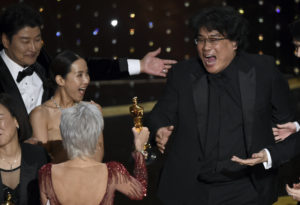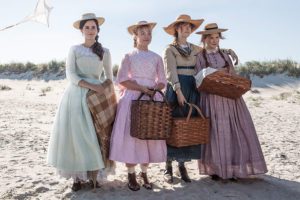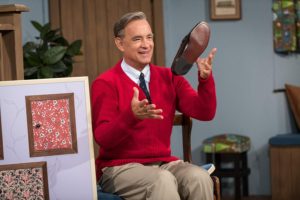Art Imitates Life in Top Films of 2017
The best movies of the year reflected the zeitgeist of America. Susan Sermoneta / CC 2.0
Susan Sermoneta / CC 2.0
The movies of 2017 reflected the year in American culture.
“The Post,” Steven Spielberg’s film about Katharine Graham’s 1971 decision to publish the Pentagon Papers, reiterated the importance of a free press in 2017, when so-called “fake news” has been under attack.
Spielberg’s film likewise alludes to another of the year’s prevalent themes: women speaking out about and resisting male opportunism. Whether it was the title figure in Patty Jenkins’ “Wonder Woman,” the sisterhood in Sofia Coppola’s “The Beguiled” retaliating against a soldier/molester, or the eponymous character in Aaron Sorkin’s “Molly’s Game”—a high-stakes poker organizer exacting revenge against the men who would exploit her—women on screen appeared a beat or two ahead of the #MeToo movement.
Much as I enjoyed these features (and many documentaries, including “Jane,” Brett Morgen’s chronicle of Jane Goodall, and “Faces Places,” Agnes Varda’s monument to overlooked French laborers), none made the final five.
The movies that got under my skin—and into my heart—were small-scale movies with big impact, love stories. In alphabetical order, they are:
“The Big Sick” Screenwriters Kumail Nanjiani and Emily Gordon based this serious romantic comedy on their real-life courtship. Director Michael Showalter brought it to life with Nanjiani, a Pakistani-American, as an aspiring comic and Zoe Kazan as the graduate student he falls for despite the fact that Nanjiani doesn’t want to marry outside his Muslim faith.
It’s only after the young lovers break it off and Emily (played by Kazan) falls into a coma that Nanjiani thinks he should commit. After all, her parents (brilliantly played by Holly Hunter and Ray Romano) are as loving, eccentric and neurotic as his (brilliantly played by Zenobia Shroff and Anupam Kher). It’s a comedy that suggests that while Pakistani-Americans and people born in America may be culturally specific, family is universal.
“Call Me by Your Name” Another film that crosses geographical boundaries, Luca Guadagnino’s impossibly lush coming-of-age story stars Timothee Chalamet as a French-American teenager in Italy, magnetically drawn to Armie Hammer, his father’s postdoctoral assistant.
Set in 1983, the film (adapted by James Ivory from the novel by Andre Aciman) traces their competition that ripens into friendship that ripens into romance. It’s a story of first love that assumes all love stories are transgressive, transcendent and universal.
“Get Out” The directorial debut of sketch comedian Jordan Peele, this potent cocktail of racial satire and paranoia stars Daniel Kaluuya as Chris, an African-American photographer in a relationship with Rose (Alison Williams), a white woman who invites him home to meet the parents, liberals who boast that they voted for Obama.
Throughout the film, which incrementally evolves from a “Guess Who’s Coming to Dinner” comedy to a haunted-house horror movie, Chris feels that he’s the wrong race in the wrong place. The comforting universals of “The Big Sick” and “Call Me by Your Name” are not for Peele. This one’s about the uncomfortable place of otherness—the twist being that blackness is the universal and whiteness the other.
“Mudbound” If the racist sees only the color that divides people and the humanist the love that unites them, then Dee Rees is a filmmaker whose humanity is ocean deep.
In Rees’ intimate epic of the McAllans and the Jacksons, landowners and sharecroppers (respectively) picking cotton cheek by jowl in the Mississippi Delta in the 1940s, relations between the two clans inch closer as World War II rages. After the war, tensions become contentiousness.
Based on Hillary Jordan’s 2008 novel, the multicharacter drama has six narrators: three McAllans, who are white, and three Jacksons, who are black. Rees’ infinite empathy with each of them enables viewers to experience the same event from multiple perspectives and appreciate the symmetry of their entwined lives. The six leads, who include Mary J. Blige and Garrett Hedlund, are individually and collectively stunning.
“Their Finest” The 1940 evacuation of Dunkirk got its close-up in at least three 2017 films. Besides the Christopher Nolan movie, the evacuation is covered—not at ground zero but at a greater distance—in “The Darkest Hour” and “Their Finest.” This last film is about the making of a Dunkirk movie and, because of its human scale, is the best of the three.
Written and directed by Lone Scherfig, “Their Finest” is set in the British Ministry of Information, where, as the London Blitz rages, filmmakers are charged with making a morale booster about the evacuation of Dunkirk.
The film is sharp about how storytellers alter the truth of war to capture the story. And the performances are lovely, especially Gemma Arterton as the screenwriter brought in to give “a woman’s touch,” and Bill Nighy, perfectly cast as an egocentric actor.
Those are my picks for the year. Which films were your favorites, and why?
Your support matters…Independent journalism is under threat and overshadowed by heavily funded mainstream media.
You can help level the playing field. Become a member.
Your tax-deductible contribution keeps us digging beneath the headlines to give you thought-provoking, investigative reporting and analysis that unearths what's really happening- without compromise.
Give today to support our courageous, independent journalists.








You need to be a supporter to comment.
There are currently no responses to this article.
Be the first to respond.